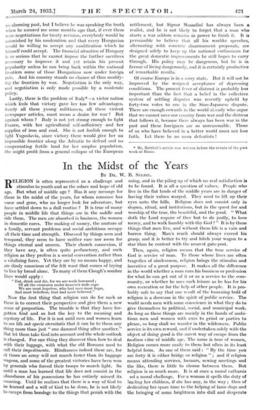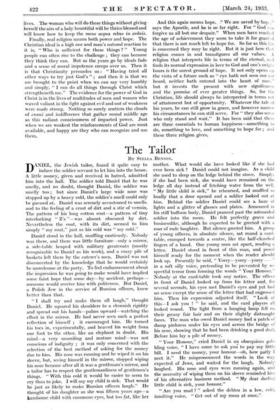In the Midst of the Years
BY DR. W.
B. SELBIE. RELIGION is often represented as a challenge and stimulus to youth and as the solace and hope of old age. But what of middle age ? Has it any message for those in the midst of the years, for whom romance has come and- gone, who no longer look for adventure, but have settled down to a dull routine ? It is true of many people in middle life that things are in the saddle and ride them. The men are absorbed in business, the women in domestic cares. The making of money, the nurture of a family, servant problems and social ambitions occupy all their time and strength. Obsessed by things seen and temporal,- they seem to have neither care nor room for things eternal and unseen. Their church connexion, if they have any, is often quite perfunctory, and such religion as they profess is a social convention rather than a vitalizing force. Yet they are by no means happy, and are dimly conscious of the felt want that comes of trying to live by bread alone. To many of them Clough's sombre lines would apply :
" Eat, drink and die, for we are souls bereaved ; Of all the creatures under heaven's wide cope We are most hopeless, who had once most hope, And most beliefless, that had most believed."
Now the first thing that religion can do for such as these is to correct their perspective and give them a new sense of proportion. The trouble is that they have for- gotten God and so lost the key to the meaning and mystery of life. For it is not until men and women learn to see life sub .specie eternitatis that it can be to them any thing more than just "one damned thing after another." But let them take God into account and the whole outlook is changed. For ope thing they discover then how to deal with their luggage, with what the old Romans used to call their impedimenta. Hindrances indeed these are, for tit times an army will not march faster than its baggage wagons, and some of the greatest victories have been won by generals who forced their troops to march light. So until a man has learned that life does not consist in the abundance of his possessions he has entirely missed its meaning. Until he realizes that there is a way of God to- be learned and a will of God to be done, he is not likely to escape from bondage to the things that perish with the using, and in the piling up of which no real satisfaction is to be found. It is all a question of values.- People who live in the flat lands of the middle years are in danger of having their values warped. They need to lift up their eyes unto the hills. Religion does not consist only in dogma, ritual, and institutions, but in the quest for and worship of the true, the beautiful, and the good. "What doth the Lord require of thee but to do justly, to love mercy, and to walk humbly with thy God ? " It is by these things that men live, and without them life is a vain and barren thing. Man's reach should always exceed his grasp, and it is better to try and hitch your wagon to a star than be content with the nearest gate-post.
Then, again, religion means that the true service of God is service of man. To those whose lives are often tragedies of aimlessness, religion brings the stimulus and incentive of a great purpose. It makes all the difference in the world whether a man runs his business or profession for what he can get out of it or as a service to the com- munity, or whether he uses such leisure as he has for his Own recreation or for the help of other people. It is pro- bably safe to say that one result of the loosening hold of religion is a decrease in the spirit of public service. The world needs men with some conscience in what they do to give themselves to political, social, and municipal work. As long as these things are mainly in the hands of ambi- tious men and women with axes to grind or parties to please, so long shall we wander in the wilderness. Public service is its own reward, and if undertaken solely with the object of doing good is the surest way of escape from the Medium vitae of middle age. The same is true of women. Religion comes more easily to them but often in its least helpful form. As one of them said : "By the time yon are forty it is either bridge or religion " ; and if religion means attending services, bazaars, sewing meetings and the like, there is little to choose between them. But religion is so much more. It is at once a moral catharsis nd a moral challenge. For a woman it spells the duty of leading her children, if she has any, in the way ; then of dedicating her spare time to the helping of lame dogs and the bringing of some brightness into dull and desperate lives. The woman who' will do these things without giving herself the airs of a lady bountiful will be thrice blessed and will know how to keep the mens aequa rebus in arduis.
Finally, real religion means both power and hope. The Christian ideal is a high one and man's natural reaction to it is, "Who is sufficient for these things ? " Young people can often rise to the challenge ; they can because they think they can. But as the years go by ideals fade and a sense of moral impotence creeps over us. Then it is that Christianity persuades us : "Having tried all other ways to try just God's " ; and then it is that we are brought to the point when we can say very humbly' and simply, "I can do all things through Christ which strengtheneth me." The evidence for the power of God in Christ is in the lives of multitudes of men and women who waxed valiant in the fight against evil and out of weakness were made strong. Nothing so surely scatters the clouds of ennui and indifference that gather round middle age as this radiant consciousness of imparted power. Just when we are weakest the reinforcements of God are most available, and happy are they who can recognize and use them. And this again means hope. "We are saved byhopt says the Apostle, and he is so far right. For "God can forgive us_ all but our despair." When men have reached the age of achievement they seem to take it for granted that there is not much left to hope for. So far as this life is concerned they may be right. But it is just here that religion comes in and transfigures all our values. A religion that interprets life in terms of the eternal, aid finds its normal expression in love to God and one's neigh- bours is the surest ground of hope. It not only opens up the vista of a future such as "eye hath not seen nor car heard, neither hath entered into the .heart of man." but it invests the present with new significance and the promise of ever greater things. So, for the Christian, life should always be interpreted in terms not of attainment but of opportunity. Whatever the tale of his years, he can still grow in. grace, and however narrow his circumstances he can still serve. For" they also serve who only stand and wait." It has been said that there are three essentials to human happiness—something to do, something to love, and something to hope for ; and these three religion gives.







































 Previous page
Previous page